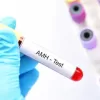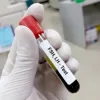What is egg freezing and how does it work?
Egg freezing is the retrieval and cryopreservation of female oocytes (egg cells). Cryopreservation means storing biological cells at a very low temperature to prevent them from degrading over time. There are several reasons that people may want to freeze their eggs, including for medical or social reasons. This series of blog posts will explore the topic of egg freezing and help you understand what to expect should you wish to freeze your eggs.
What is the process of egg freezing?
- In order to give you the best treatment, the process begins with a consultation with our in‑house doctor. Here, we can learn more about your reasons for freezing your eggs and the best options for you, moving forward.
- To check your ovarian reserve (how many eggs you have remaining), we check the levels of a hormone in your blood called Anti-Mullerian Hormone (AMH) via a blood test. Additionally, we conduct an antral follicle count scan which tells us how many follicles can be recruited in a typical cycle. This scan is often conducted trans‑vaginally.
- The results of these tests allow clinical staff to prescribe the correct dosage of medications which will help stimulate egg production. However, the treatment cannot start until a pre-stimulation scan has been performed. This scan, performed on the second day of your period, determines whether the lining of the uterus is ready for stimulation. Once this has been confirmed, stimulation medication can begin. These medications are often administered by injection into fatty tissues.
- When a certain number of follicles reach the required size, another medication is administered to “trigger” you. This means that the eggs can now mature, ready to be collected in 36 hours’ time. Egg collections are performed by our in-house doctor. During the procedure, you will be under sedation, so you won’t experience any pain.
- Once your eggs have been collected, our embryologists can count them and check their quality. They are then frozen using a vitrification process, whereby the eggs are cooled very rapidly in the presence of protective chemicals (cryprotectants), which prevent the formation of ice crystals which could damage the cell.
- The eggs are then placed into storage at -196°C, until you are ready for them to be thawed and fertilised.
If you are considering freezing your eggs, get in touch with IVF London to discuss your options.
You can also meet the team at our free Egg Freezing Open Evening on the 20th February. Book your space here.
Cobo, A., Meseguer, M., Remohí, J. and Pellicer, A., 2010. Use of cryo-banked oocytes in an ovum donation programme: a prospective, randomized, controlled, clinical trial. Human reproduction, 25(9), pp.2239-2246.





